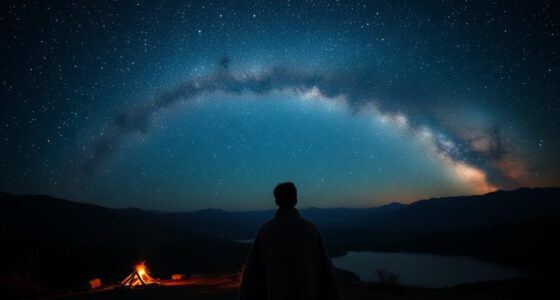Protecting the night sky from light pollution is crucial because it preserves our cultural heritage, supports ecosystems, and ensures future generations experience the wonder of stars. Excessive artificial light erases celestial stories and disrupts wildlife, harming natural ecosystems. By turning off unnecessary lights and advocating responsible choices, you can help safeguard this natural beauty. If you stay engaged, you’ll discover powerful quotes that inspire action and remind us of the importance of keeping the night dark.
Key Takeaways
- Protecting dark skies preserves cultural heritage, folklore, and historical significance tied to celestial patterns.
- Reducing light pollution benefits ecosystems, supporting wildlife, plant life, and ecological balance.
- Responsible lighting minimizes energy waste, lowering environmental impact and conserving resources for future generations.
- Preserving the night sky enhances scientific research and astronomical observations.
- Small actions, like turning off unnecessary lights, collectively help maintain natural darkness and celestial beauty.
The Darkness That Inspires
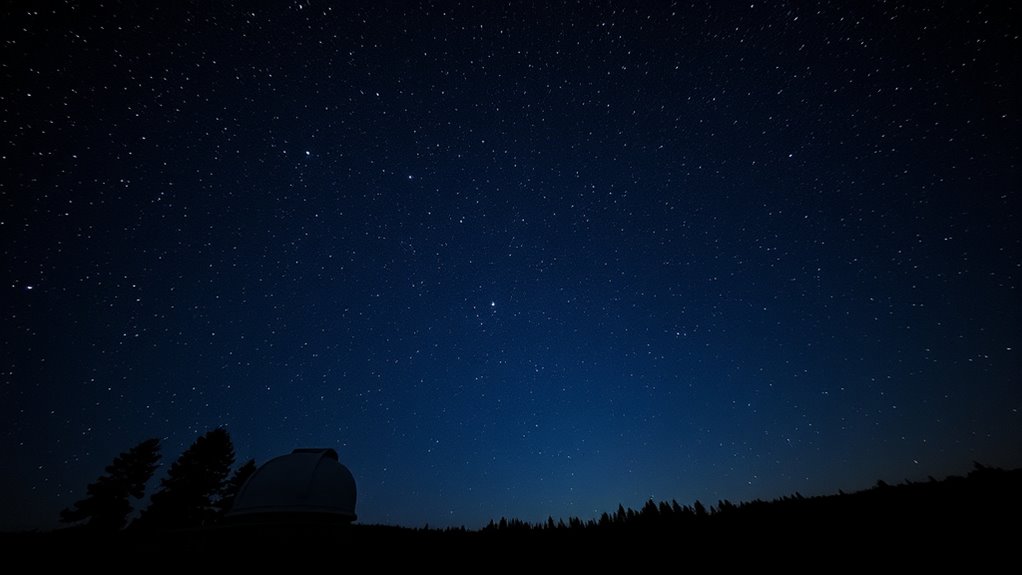
The darkness of the night sky has long inspired awe and wonder, reminding us of the vast universe beyond our reach. Yet, in cities, the urban glow diminishes this natural darkness, dulling the sense of mystery and scale. Despite the bright lights, the nocturnal silence still whispers secrets of the cosmos, beckoning you to look up and reflect. The contrast between the vibrant city lights and the quiet night sky emphasizes how much we’ve lost to light pollution. Protecting the darkness isn’t just about stargazing; it’s about preserving that sense of wonder and connection to the universe. When we reduce unnecessary light, we restore the night’s natural silence and allow ourselves to be inspired by the true beauty of the night sky. Increased awareness of light pollution can motivate communities to adopt better outdoor lighting practices that safeguard our view of the stars.
Stars Beyond Our Reach
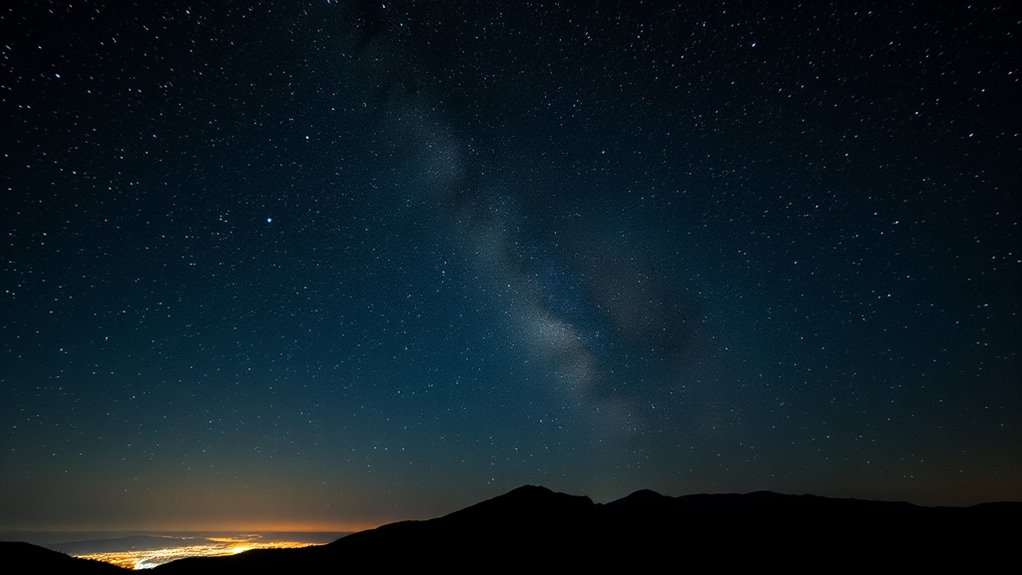
Have you ever wondered about the stars that remain forever out of reach? Urban glow and increased sky brightness make it harder to see those distant suns. Light pollution washes out the faintest stars, hiding the universe’s true splendor. When city lights dominate, only the brightest stars shine through, leaving countless others invisible. You might imagine a night sky filled with endless twinkling, but reality dims that wonder. These stars, beyond our reach, hold secrets about the cosmos and our origins. The more we light up our nights unnecessarily, the more we obscure this celestial treasure. Protecting the night sky means reducing urban glow and controlling sky brightness, so future generations can glimpse the universe’s full magnificence. Online resources are available to help communities understand and implement effective light pollution reduction measures.
Preserving the Night for Future Generations

Protecting the night sky today guarantees that future generations can still experience its wonder. As urban expansion continues, increasing artificial light threatens to drown out the stars and disrupt natural darkness. By reducing unnecessary lighting and implementing better lighting practices, you help lower energy consumption, which benefits both the environment and our nightscapes. Preserving darkness isn’t just about aesthetics; it’s about maintaining ecological balance and cultural heritage. When communities adopt responsible lighting, they prevent the irreversible loss of the night’s beauty. Your actions today can slow the spread of light pollution, ensuring that children and future explorers can gaze upward and marvel at the cosmos. Implementing proper lighting design minimizes light spillage and preserves the natural darkness of the night sky. Protecting the night sky is a legacy that sustains our connection to the universe for generations to come.
The Silent Call of the Night Sky

As darkness falls, the night sky silently beckons you with its ancient, unspoken language. Its stars once guided sailors through celestial navigation, connecting us to a time when the sky was a crucial map. Today, that call remains essential for nocturnal ecosystems, which depend on natural darkness to thrive. Without light pollution, these ecosystems function in harmony, supporting creatures that rely on the stars for migration, hunting, and communication. The silent beauty of the night sky reminds you of a world that’s still alive, still whispering its secrets. By protecting this darkness, you preserve not only our shared heritage but also the delicate balance of life that depends on it. Recognizing light pollution as a major threat helps us understand the importance of maintaining dark skies for ecological health. Listening to the night’s call keeps that vital connection alive.
Light Pollution: A Threat to Our Heritage
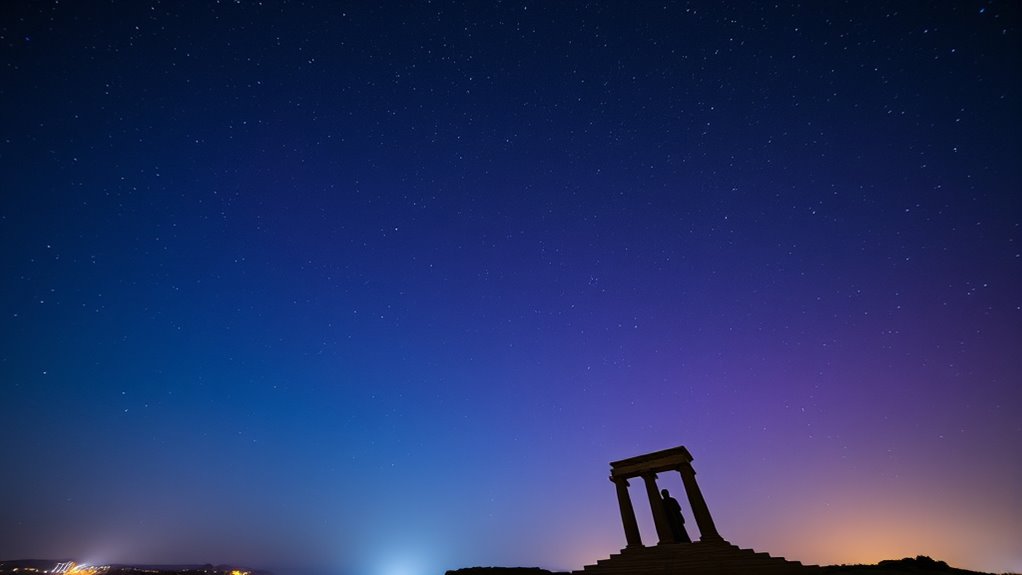
Light pollution is erasing the darkness that connects us to our cultural roots and history. As the night sky brightens with artificial light, you risk losing ancient stories and traditions tied to the stars. Without action, our heritage under the night sky may vanish forever. Monitoring signs of spoilage in natural darkness can help us better understand the importance of preserving these invaluable connections.
Cultural Losses and Darkness
When artificial light spills into the night sky, it washes out the stars and obscures the celestial patterns that have guided humanity for centuries. This loss of darkness leads to cultural erosion, as countless traditions, stories, and rituals are tied to the night sky. Without clear views of the stars, you risk heritage loss—diminishing the connection between people and their ancestral knowledge. Darkness fosters a sense of wonder and identity rooted in shared celestial experiences. When that darkness fades, so does a essential part of cultural history. Protecting the night sky isn’t just about astronomy; it’s about safeguarding the stories, symbols, and customs that define our collective human experience. Darkness preserves cultural richness, ensuring future generations can still look up and find meaning in the stars. Moreover, embracing mindful light pollution practices can help preserve these cultural treasures for generations to come.
Heritage Under Threat
Artificial light pollution steadily erodes the cultural heritage woven into our night skies, threatening to erase centuries of traditions, stories, and symbols. As urban development expands, brightening cities and altering the natural darkness, you risk losing connection to historical narratives rooted in the stars. Technological progress, while advancing society, often leads to excessive artificial lighting that diminishes our view of the night sky. This unchecked growth jeopardizes ancient practices, folklore, and cultural landmarks tied to celestial events. Without action, future generations may inherit a world where the night sky’s heritage is just a distant memory. Protecting our dark skies isn’t just about stargazing; it’s about preserving a crucial part of our shared identity and history against the relentless march of progress and urbanization. Dark sky protection is essential for maintaining the cultural and historical significance embedded in our nightscape.
Embracing Darkness, Embracing Wonder

Although many people see darkness as something to fear or avoid, it actually holds a profound beauty and wonder that’s often overlooked, especially in today’s brightly lit world. When you embrace darkness, you open yourself to celestial mysteries hidden beyond the glare of artificial lights. The night sky reveals its secrets only when the darkness is allowed to flourish, offering a glimpse into the universe’s vastness. It’s in this quiet, nocturnal serenity that you can truly connect with the cosmos and experience awe. Darkness isn’t an obstacle; it’s an invitation to discover the universe’s wonders. By valuing the night’s natural darkness, you honor the celestial mysteries that have fascinated humanity for centuries, reminding us of the universe’s endless beauty and our place within it.
The Cost of Artificial Lights
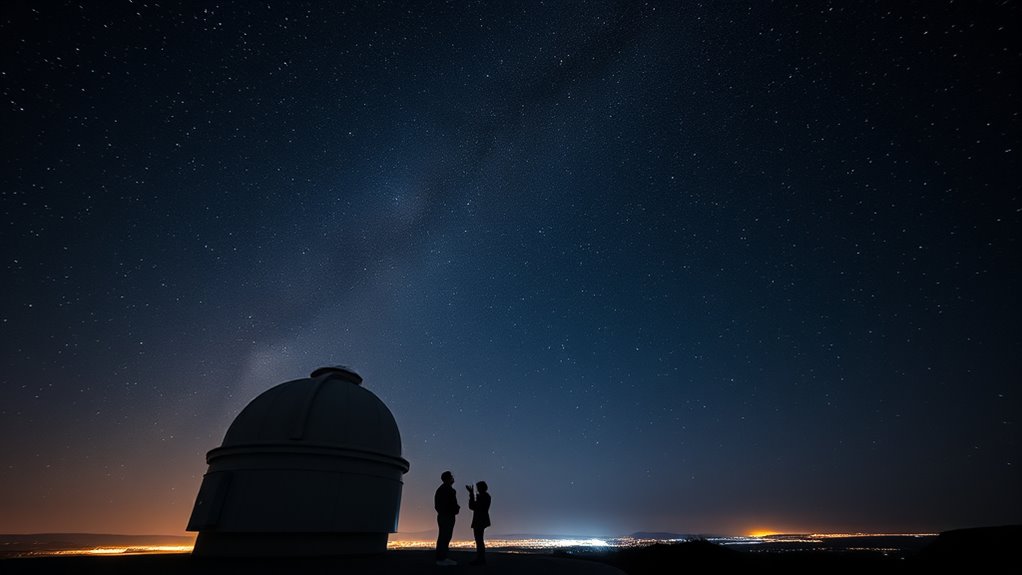
Have you ever considered how the bright, constant glow of artificial lights impacts more than just our night vision? The urban glow from excessive outdoor lighting leads to significant energy waste. You might not realize that much of this light spills into the sky, wasting electricity and increasing your carbon footprint. This unnecessary energy consumption drives up costs for cities and residents alike, while contributing to environmental degradation. Over-illuminating areas also disrupts ecosystems, affecting wildlife and plant life. Additionally, light pollution can interfere with astronomical observations, hindering scientific research and our understanding of the universe. By using more efficient lighting and reducing unnecessary brightness, you can help cut energy waste and lessen the economic and environmental costs associated with artificial lights. Recognizing this cost is the first step toward smarter, sustainable lighting practices that protect our night sky.
Protecting the Universe’s Natural Canvas
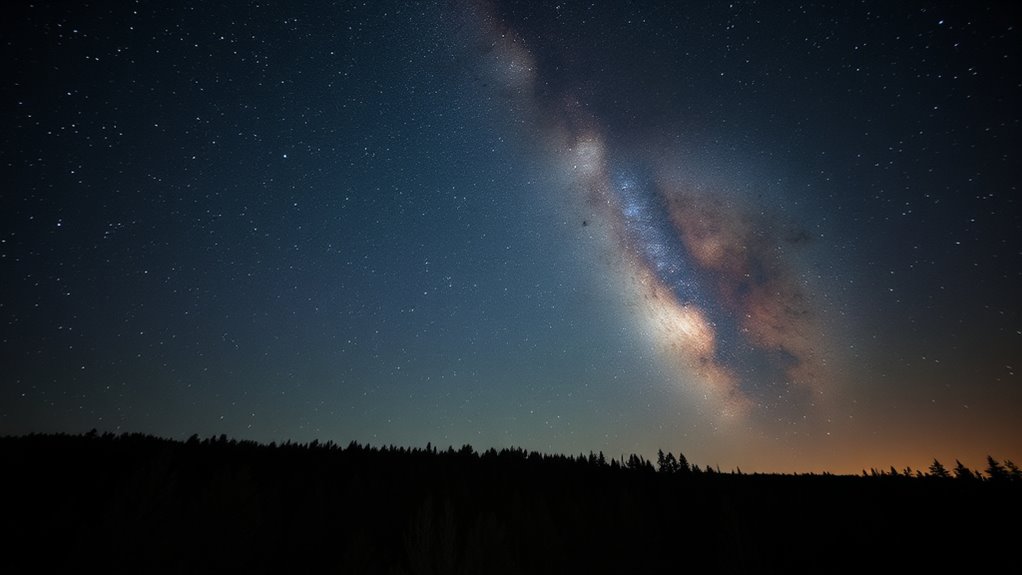
Protecting the universe’s natural canvas means preserving the clarity and beauty of the night sky for everyone to enjoy. As urban expansion continues, artificial lights spread further, drowning out stars and natural darkness. Technological advancements offer solutions, like better-designed fixtures and smart lighting controls, that reduce unnecessary light spill. By implementing these innovations, you help maintain the night’s pristine quality, ensuring future generations can experience the cosmos as you do today. It’s essential to advocate for responsible lighting policies and support community efforts to minimize light pollution. Your actions, whether through awareness or local initiatives, contribute to safeguarding our shared celestial heritage. Proper lighting design plays a crucial role in protecting the night sky from excessive illumination. Protecting the night sky isn’t just about aesthetics; it’s about preserving a crucial part of our universe’s natural beauty.
When the Night Fades, What Do We Lose?
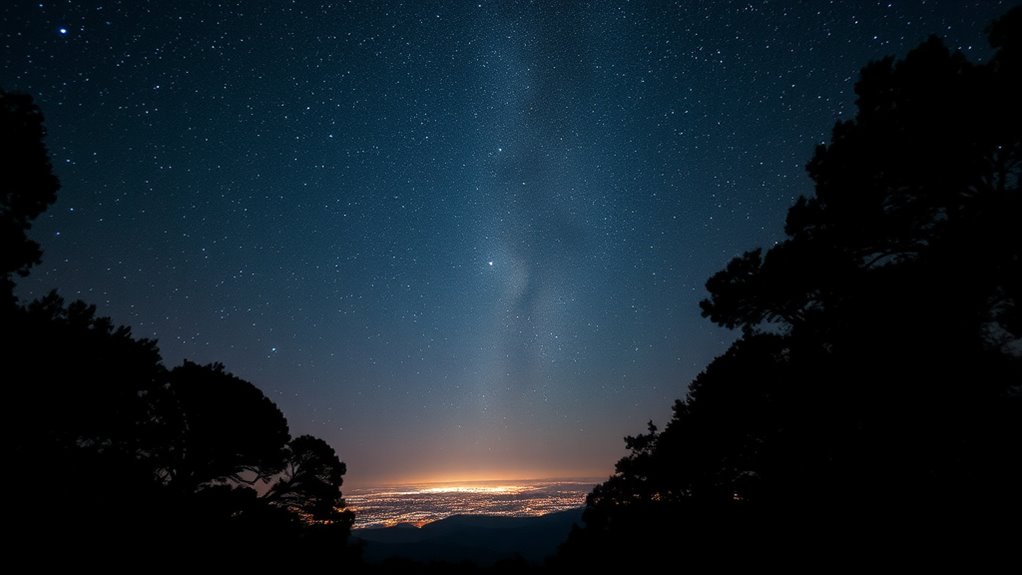
When the night sky becomes obscured by artificial light, we lose more than just the sight of twinkling stars. The urban glow brightens our surroundings, increasing sky brightness and drowning out celestial wonders. As light pollution intensifies, our ability to connect with the universe diminishes, and we miss out on the natural beauty that inspires curiosity and awe. This loss affects not only astronomers but everyone who seeks solace in the night’s quiet. When sky brightness rises, it alters ecosystems, disrupts animal behaviors, and hampers our understanding of the cosmos. Additionally, light pollution can interfere with night sky visibility, making it more difficult to observe celestial events. Ultimately, we trade the serenity and mystery of the night for an illuminated but impoverished sky, losing a crucial part of our cultural and scientific heritage.
A Call to Turn Off the Lights
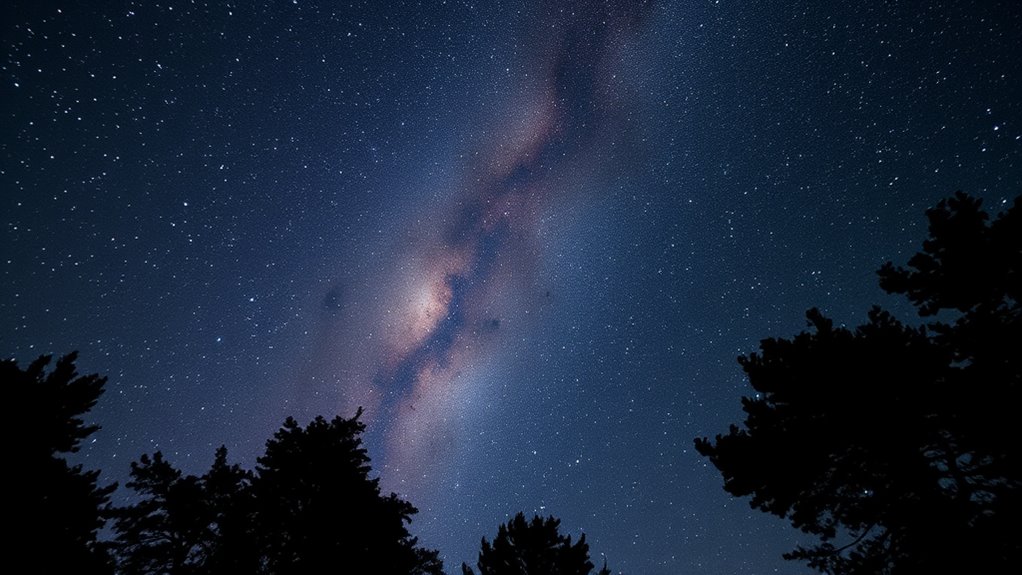
Turning off unnecessary outdoor lights is one of the simplest yet most effective steps you can take to combat light pollution. When you switch off unneeded lighting, you help reduce the urban glow that drowns out the night sky. This small action cuts down on energy waste, saving resources and lowering carbon emissions. Often, outdoor lights stay on all night without reason, contributing to skyglow and making it harder to see stars. By turning off lights when they’re not needed, you directly support dark sky preservation and protect nocturnal environments. It’s a simple gesture with a powerful impact: less energy waste, a darker night sky, and a future where we can still enjoy the beauty of the cosmos. Every light turned off counts.
Frequently Asked Questions
How Does Light Pollution Affect Nocturnal Wildlife and Ecosystems?
Light pollution disrupts nocturnal wildlife and ecosystems by interfering with their natural behaviors. You might not realize it, but artificial light alters nocturnal behavior, making animals less active or disoriented. This ecosystem disruption can lead to declines in populations and imbalances in food chains. When you reduce unnecessary lighting, you’re helping preserve these essential nocturnal activities and maintaining healthy ecosystems for all species involved.
What Are the Best Ways for Individuals to Reduce Light Pollution?
Think of your home as a lighthouse guiding the night rather than a torch that drowns out stars. You can reduce light pollution by adjusting your personal lighting—using dimmer bulbs, shielding outdoor lights, and turning them off when not needed. Join community initiatives that promote responsible lighting. Together, your efforts help preserve the night sky, letting everyone enjoy its wonder and protecting nocturnal wildlife from unnecessary glare.
Can City Planning and Policies Effectively Combat Light Pollution?
City planning and policies can effectively combat light pollution by regulating urban lighting and promoting responsible lighting practices. When you support policies that enforce proper urban lighting standards, you help reduce unnecessary glare and skyglow. Implementing clear policies encourages the use of shielded fixtures and lower-intensity lights, making a significant difference. Your advocacy for strong policy implementation helps preserve the night sky and protects our environment from the harmful effects of excess artificial light.
How Does Light Pollution Impact Astronomical Research and Observations?
Light pollution limits your ability to observe celestial sights, disrupting astronomical research and observations. It diminishes star visibility, making it harder for scientists to gather accurate data. Satellite imaging suffers as artificial brightness interferes with capturing clear images of space. When city lights flood the night sky, it hampers discoveries and dulls our understanding of the universe, highlighting the urgent need for policies that protect our night skies for future scientific and stargazing pursuits.
What Cultural or Historical Sites Are Most Threatened by Light Pollution?
You might not realize it, but light pollution threatens many cultural and historical sites, especially ancient temples and heritage landmarks. Bright artificial lights obscure their nighttime beauty and diminish their spiritual significance. As you explore these sites, you could miss the full experience and historical context. Protecting dark skies helps preserve these treasures, ensuring future generations can admire their timeless beauty without the interference of unnecessary artificial illumination.
Conclusion
If you turn off your lights for just one hour during Earth Hour, over 3,000 cities worldwide participate, showing how collective action can reduce light pollution. Remember, by protecting the night sky, you help preserve a natural wonder enjoyed by only 10% of the world’s population. So, next time you see a bright city glow, consider switching off your lights and reconnecting with the universe’s timeless beauty. Every small step counts.




